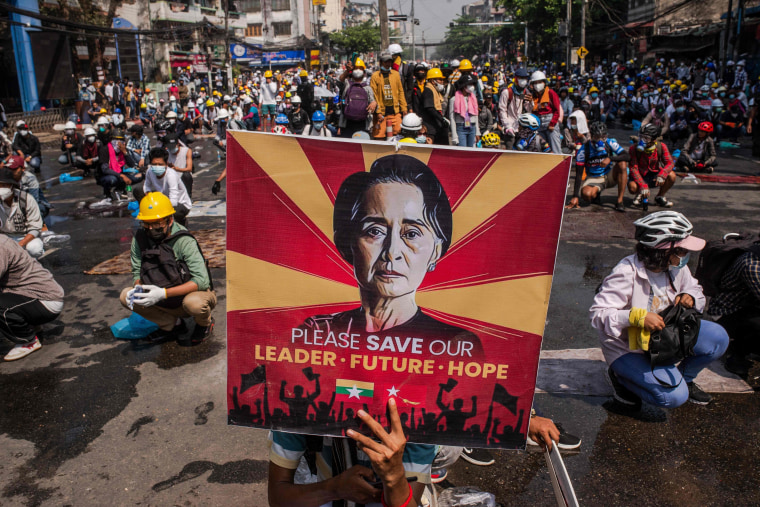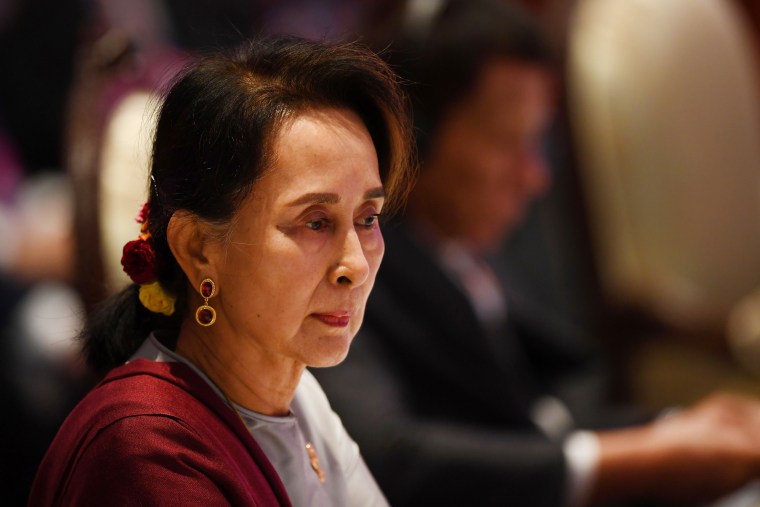A court in military-ruled Myanmar sentenced deposed leader Aung San Suu Kyi to five years in jail on Wednesday after finding her guilty in the first of 11 corruption cases against her, a source with knowledge of the proceedings told NBC News.
The Nobel laureate and figurehead of Myanmar’s opposition to military rule is charged with at least 18 offenses carrying combined maximum jail terms of nearly 190 years, all but killing off any chance of a political comeback.
Download the NBC News app for breaking news and politics
The judge in the capital, Naypyitaw, handed down the verdict within moments of the court convening and gave no explanation, said the source, who declined to be identified because the trial is being held behind closed doors, with information restricted.
Myanmar’s state media has not reported developments in Suu Kyi’s multiple legal cases, and in October authorities barred her lawyer from speaking about them to media, diplomats, international organizations and foreign governments.
Suu Kyi, 76, led Myanmar for five years during a short period of tentative democracy before being forced from power in a coup in February 2021 by the military, which has ruled the former British colony for five of the past six decades.
It was not immediately clear if she would be transferred to a prison to serve the sentence.
Since her arrest she has been held in an undisclosed location, where junta chief Min Aung Hlaing previously said she could remain after earlier convictions in December and January for comparatively minor offenses, for which she was sentenced to six years altogether.
Myanmar’s ministry of legal affairs, ministry of information and Supreme Court did not immediately respond to emailed requests for comment.

The latest case centered on allegations that Suu Kyi accepted gold and cash payments totaling $600,000 from her protégé-turned-accuser Phyo Min Thein, the former chief minister of the city of Yangon.
Suu Kyi had called the allegations “absurd” and denies all charges against her, which include violations of electoral and state secrets laws, incitement and corruption.
Phil Robertson, deputy Asia director at Human Rights Watch, said Suu Kyi’s days as a free woman were effectively over.
“Myanmar’s junta and the country’s kangaroo courts are walking in lockstep to put Aung San Suu Kyi away for what could ultimately be the equivalent of a life sentence, given her advanced age,” he said.
“Destroying popular democracy in Myanmar also means getting rid of Aung San Suu Kyi, and the junta is leaving nothing to chance.”
Myanmar has been in turmoil since the coup, with nationwide protests and public anger suppressed by the military with lethal force. Tens of thousands of people have been arrested and many killed, tortured and beaten, in what the United Nations has called crimes against humanity.
The international community has imposed sanctions on the military and dismissed Suu Kyi’s trials as farcical. The embassies in Myanmar of the United States and Britain did not immediately respond to requests for comment.
The military has said Suu Kyi committed crimes and is being given due process by an independent judiciary and rejects foreign criticism as interference.
The junta has refused to allow her visits, including by a special Southeast Asian envoy trying to end the crisis.
Suu Kyi’s conviction Wednesday indicates that the junta “has no intention to resolve the situation peacefully,” said Tun Aung Shwe, a member of the shadow National Unity Government, which has declared a people’s revolt against military rule.
“It’s another action that closes the door to political dialogue,” he said.
